Uncategorized
Rabbis Angela Buchdahl and Elliot Cosgrove show the split in the pulpit over political endorsements
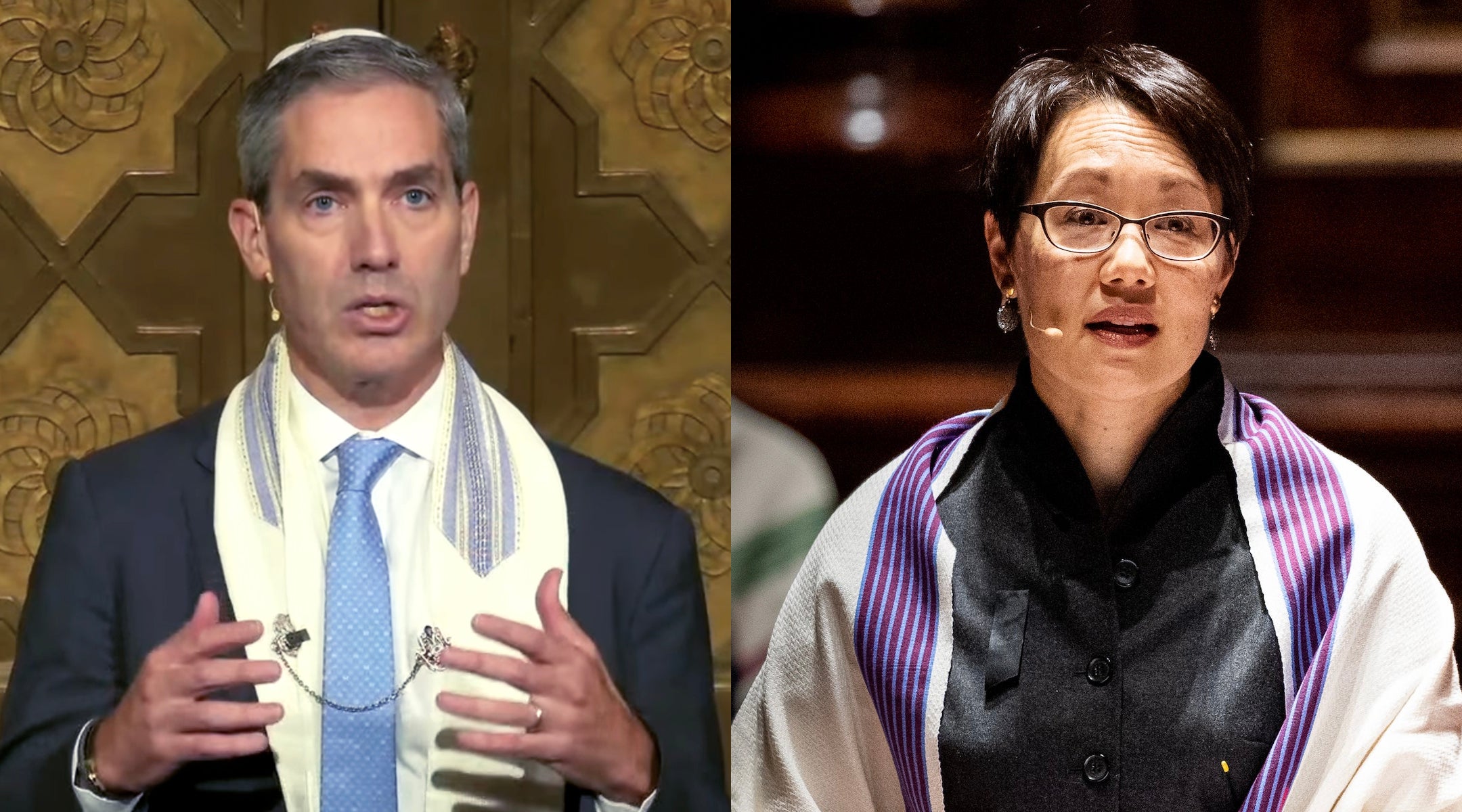
(JTA) — Go figure: A non-Jewish, non-Zionist politician has sparked a national Jewish conversation about the role of the rabbi.
If elected next week, the 34-year-old progressive Zohran Mamdani would be the first mayor of New York City who came up through the trenches of pro-Palestinian activism, and the first to reject the idea that being mayor to a city with 1 million Jews means being a supporter of Israel.
The prospect has shaken a Jewish mainstream that has long taken that support for granted, considers Zionism a pillar of its Jewish identity and sees Mamdani as an enabler of the kind of strident anti-Israel protests that make them feel unsafe.
In turn, that has put pressure on rabbis throughout the five boroughs and beyond to take a stand — not just by defending Zionism and Jewish security but by denouncing Mamdani and endorsing his rivals. With the IRS in July having lifted the 60+-year-old ban that prevented houses of worship from endorsing or opposing candidates, rabbis who would prefer to stay above the fray have lost their cover.
Also gone are the days when the decision to use the bimah as a bully pulpit was between a rabbi and his or her congregation. Non-Orthodox synagogues regularly post their rabbis’ Shabbat sermons to YouTube. A petition signed by over 1,100 rabbis calling on voters to reject anti-Zionist candidates like Mamdani has become a very public roll call of rabbis who are willing to engage directly in electoral politics.
The inescapably public profile of being a rabbi amid a high-stakes election was seen in the contrasting positions taken by leaders of two influential and prosperous Manhattan congregations. In a sermon shared on YouTube and the synagogue’s web site, Rabbi Elliot Cosgrove of Park Avenue Synagogue made his position clear from his very first sentence: “I believe Zohran Mamdani poses a danger to the security of New York’s Jewish community.” He not only urged members of his Conservative shul to vote for Mamdani’s leading rival, former New York Gov. Andrew Cuomo, but laid out a specific strategy for convincing undecided and Mamdani-curious Jewish voters to do the same.
About 30 blocks south, Rabbi Angela Buchdahl of Central Synagogue, whose recent sermon on the Gaza war drew over 120,000 views on YouTube, wrote a letter to her Reform congregation about the mayoral race. Without naming Mamdani, she insisted that elected leaders “must reject the idea that Jewish self-determination is up for negotiation,” while reaffirming her synagogue’s policy “of not endorsing or publicly opposing political candidates.”
Some might find that coy — a rabbinic version of the New York Times’ controversial “non-endorsement” endorsement of Cuomo. But Buchdahl has become one of the country’s best-known rabbis in part on her ability to articulate Jewish concerns in a way that embraces and respects those who might disagree with her. Her Gaza sermon deftly conveyed Jewish dismay over the scale of the killings and hunger in Gaza while sympathizing with the fears and dilemmas of average Israelis.
The letter makes clear where she and her team stand on Zionism and fighting antisemitism: “We have spoken from the pulpit in multiple past sermons and will continue to take a clear, unambiguous position on antisemitism, on anti-Zionist rhetoric, and on sharing our deep support for Israel.” Mamdani was unmistakably the subject when she added, “I hope and expect anyone who becomes mayor of our amazing city — home to the largest Jewish population outside of Israel — will take very seriously the expressed concerns (made directly and publicly) of so many of us in the Jewish community.”
She also explains why the synagogue considers nonpartisanship a practical and spiritual value. “It remains our conviction that political endorsements of candidates are not in the best interest of our congregation, community, or country,” she writes, adding, “Our role is not to enter political campaigns or to endorse or speak out against candidates, but to provide moral and spiritual clarity on important public issues.”
Cosgrove doesn’t explicitly address the debate over whether a rabbi should endorse a political candidate, but writes that the stakes of the mayoral race are too high for him not to weigh in on the candidates.
“I wish it were otherwise,” he said. “I wish we had two candidates with equal interest, or better yet, equal disinterest in the Jewish community…. But this election cycle, that is simply not the case. We can only play the cards we are dealt. And in this hand, I choose to play the one that safeguards the Jewish people, protects our community, and ensures that our seat at the table remains secure.”
He also defends his public political stand in spiritual terms.
“Self-preservation and self-interest are not only legitimate, but essential to sustaining an ethical life,” he said, citing the Talmudic sage Hillel.
While both rabbis have ranged widely in their sermons and activism, their messages on the mayor’s race offer two different models for leadership. Cosgrove spoke in the voice of a political strategist and community organizer; Buchdahl’s letter was about protecting the integrity of her institution and the diverse individuals it serves.
By dint of their influential congregations, media savvy and charisma, Cosgrove and Buchdahl are rabbis with citywide and, especially in Buchdahl’s case, national stature. The rabbis’ petition quoted Cosgrove, although he did not sign it; Buchdahl recently promoted her memoir about growing up Korean-American, and her unasked for role as a hostage negotiator, on CBS Mornings. Their positions have weight in a debate that has dogged rabbis ever since the pulpit became a place not just for parsing fine points of Jewish law or offering homilies, but commenting on current events.
A frequently cited role model for activist rabbis is Joachim Prinz, the German refugee who led congregations in Newark, New Jersey and its suburbs in the last century. Even before leaving Germany he would rail against the Nazis. In America, he bucked the clear isolationist trend — and fear among many Jews of a backlash — by insisting that Europe’s fight was America’s fight.
Prinz rejected the traditional model of the drash, or homily, finding it “too solemn and lacking in concrete meaning. I was always out to find something relevant to the life of the people sitting in front of me.” He wondered how seriously people would take a faith tradition whose clergy couldn’t offer guidance on, say, waging war, addressing poverty or resisting authoritarianism.
Throw in Jewish security, and the stakes get higher yet.
Prinz’s jeremiads against Nazism and later in support of civil rights would assure his place in American-Jewish history. Whether it would assure him a place in a modern American pulpit is another story. Support for “social justice” — in the form of volunteerism and charitable giving — is fine. Also tolerated is a certain amount of activism on consensus issues, which have lately become elusive.
As for urging specific stands on candidates or pieces of legislation — rabbis quickly learn that neither smooths their path to contract renewal.
For many congregants, this is as it should be. They feel that the great knotty corpus of Jewish text shouldn’t be reduced to a policy prescription, or that they shouldn’t be forced to hear a political speech in a house of worship.
Cosgrove especially anticipated the kinds of objections — mostly tactical — he thought he might get from congregants: Opposing a popular candidate like Mamdani would invite an antisemitic backlash, or centering Zionism in the mayor’s race would confirm the slander of dual loyalty.
Buchdahl faced the opposite pressure: congregants insisting she endorse Cuomo. There have been some nasty Instagram posts calling her timid, with comments suggesting that some congregants may have resigned over the saga.
Buchdahl’s letter insists that declining to endorse does not mean she and the synagogue are abdicating their responsibility to Jewish safety. Rather, she wrote, the synagogue does its job by instilling the values that shape the political decisions of its congregants.
“Our role,” she wrote, “is not to enter political campaigns or to endorse or speak out against candidates, but to provide moral and spiritual clarity on important public issues.”
The post Rabbis Angela Buchdahl and Elliot Cosgrove show the split in the pulpit over political endorsements appeared first on The Forward.
Uncategorized
A border official mocked an attorney for observing Shabbat. Orthodox lawyers say the issue is not new.
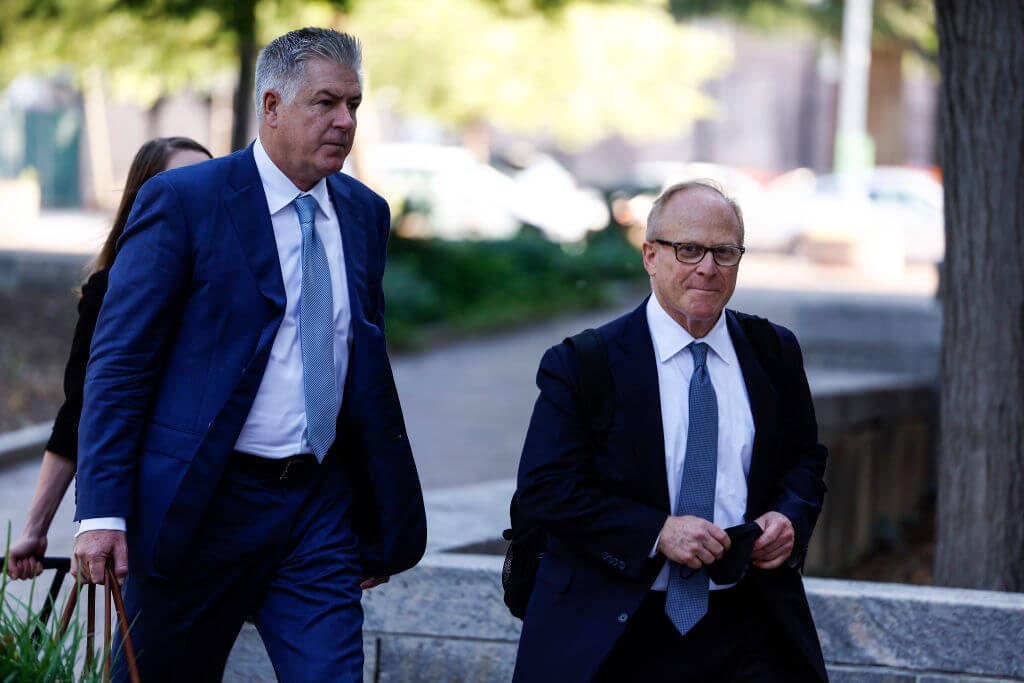
Gregory Bovino, the Border Patrol official who led immigration raids in Minneapolis, reportedly mocked the Jewish faith of Minnesota’s U.S. attorney during a phone call with other prosecutors in mid-January. According to The New York Times, Bovino complained that Daniel Rosen, an Orthodox Jew, was hard to reach over the weekend because he observes Shabbat and sarcastically pointed out that Orthodox Jewish criminals don’t take the weekends off.
The call took place at a moment of extreme tension in Minneapolis, as federal agents under Bovino’s command carried out an aggressive immigration crackdown that had already turned deadly. It came between the fatal shootings of Renée Good and Alex Pretti, both killed during enforcement operations, and amid fierce backlash from local officials and residents.
Bovino made the remarks in a derisive, mocking tone, the Times reported, casting Shabbat observance as a point of ridicule. Bovino had already drawn national attention for frequently wearing an olive double-breasted greatcoat with World War II-era styling, leading some critics to call him “Gestapo Greg” and accusing him of “Nazi cosplay.” Bovino, who pushed back on those comparisons, has since been reassigned.
Rosen, a Trump nominee, was confirmed as Minnesota’s U.S. attorney in October 2025 after a career in private practice and Jewish communal leadership. He has said that rising antisemitism helped motivate his decision to take the job, and that prosecuting hate crimes would be a priority for his office.
For many Orthodox Jewish lawyers, Bovino’s alleged remarks were not surprising. They echoed a familiar challenge: explaining that Shabbat — a full day offline — is not a lack of commitment, but a religious boundary that cannot be bent without being broken.
In a profession that prizes constant availability, that boundary can carry consequences. Some lawyers say it shows up in subtle ways: raised eyebrows, jokes about being unreachable, skepticism when they ask for time off. Others say it has shaped much bigger decisions, including how visibly Jewish they allow themselves to be at work.
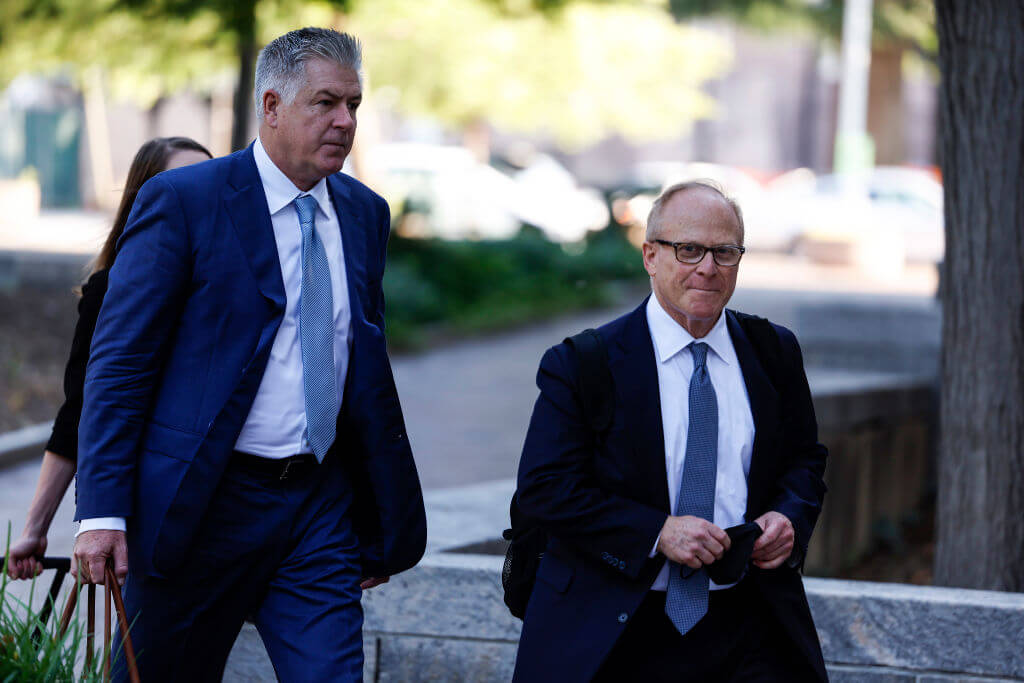
David Schoen, an Orthodox criminal defense attorney who served as lead counsel for President Donald Trump during his second impeachment trial, said he has long been mindful of how religious observance is perceived in the courtroom.
“I have made a conscious decision not to wear my yarmulke in front of a jury,” Schoen said, explaining that jurors often “draw stereotypes from what they see.”
Those concerns were reinforced by experience. Schoen said he has noticed a “definite difference in attitude” from some judges depending on whether he wore a yarmulke. In one case, he recalled, a Jewish judge pulled him aside during a jury trial and told him she thought he had made the right choice — a comment Schoen said he found disappointing.
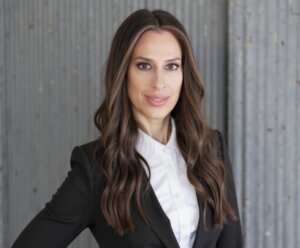
For Sara Shulevitz, a criminal defense attorney and former prosecutor, the Bovino episode brought back memories from early in her career.
Orthodox and the daughter of a Hasidic rabbi — now married to one — Shulevitz said her unavailability on Jewish holidays was often treated as a professional flaw rather than a religious obligation. “It held me back from getting promotions,” she said.
In court, the scrutiny could be blunt. “I was mocked by a Jewish judge for celebrating ‘antiquated’ Jewish holidays,” she said, recalling requests for continuances for Shemini Atzeret and Simchat Torah. In another case, she said, a judge questioned her request for time off for Shavuot and suggested she had already “taken off for Passover.”
When another judge assumed Passover always began on the same day in April, “I had to explain the Jewish lunar calendar in the middle of court while everyone was laughing,” she said.
Not every encounter, Shulevitz added, was rooted in hostility. Sometimes judges simply didn’t understand Orthodox practice. When she explained she couldn’t appear on a Jewish holiday, judges would suggest she join the hearing by Zoom — forcing her to explain that Orthodox Jews don’t use electrical devices on Shabbat or festivals.
The misunderstanding often slid into a familiar assumption. “They think you’re lazy,” she said. “It’s not laziness. Any Jewish woman knows how much work goes into preparing for Passover.”
Rabbi Michael Broyde, a law professor at Emory University who studies religious accommodation, said that Bovino’s alleged “derogatory remarks” are “sad and reflects, I worry, the antisemitic times we seem to be living in.”
He added that the criticism of Rosen reflected a basic misunderstanding of how law offices operate, calling it “extremely rare” for a lawyer’s religious practices to interfere with their obligations, especially when senior attorneys delegate work and courts routinely grant continuances.
“No one works 24/7,” Broyde said.
The episode echoed a similar Shabbat-related incident during Trump’s first term. In his 2022 memoir, former Trump trade adviser Peter Navarro described how a group sought to undermine Trump son-in-law Jared Kushner’s role in the 2020 campaign by scheduling a key White House meeting with Trump on a Saturday, knowing Kushner — who is Shabbat observant — would not attend. Navarro titled the chapter recounting the episode, “Shabbat Shalom and Sayonara.”
The tension between Jewish observance and public life is not new. Senator Joe Lieberman, the first observant Jew to run on a major-party presidential ticket, famously walked to the Capitol for a Saturday vote and ate fish instead of meat at receptions. His longtime Senate colleague Chris Dodd joked that he became Lieberman’s “Shabbos goy.”
Still, Schoen said, visibility can cut both ways. During Trump’s impeachment trial, while speaking on the Senate floor, he reached for a bottle of water and instinctively paused. With one hand holding the bottle, he used the other to cover his head — a makeshift yarmulke — before drinking.
The moment was brief, but it did not go unnoticed. In the days that followed, Schoen said he heard from young Jewish men and businesspeople who told him that seeing the gesture made them feel more comfortable wearing their own yarmulkes at work.
The attention, he said, was unexpected. But for some in the Orthodox community, it became a source of pride.
“I felt honored,” Schoen said.
My guess in all seriousness is that he normally wears a yarmulke and this was reflex. Schoen is modern Orthodox so that would make sense. But I defer to @jacobkornbluh https://t.co/MkKx6W03v2
— Jake Tapper 🦅 (@jaketapper) February 9, 2021
Jacob Kornbluh contributed additional reporting.
The post A border official mocked an attorney for observing Shabbat. Orthodox lawyers say the issue is not new. appeared first on The Forward.
Uncategorized
Deni Avdija becomes first Israeli to be selected as an NBA All-Star
(JTA) — Portland Trail Blazers star Deni Avdija’s meteoric rise has officially reached a new stratosphere, as the 25-year-old forward has become the NBA’s first-ever Israeli All-Star.
Avdija was named an All-Star reserve for the Western Conference on Sunday, an expected but deserved nod after the northern Israel native finished seventh in All-Star voting with over 2.2 million votes, ahead of NBA legends LeBron James and Kevin Durant. Avdija’s breakout performance this season has earned him repeated praise from James and others across the league.
Avdija’s star turn began last year in his first season with Portland, when he further captured the adoration of Jewish fans across Israel and the U.S. But he took another step forward this season, averaging 25.8 points, 6.8 assists and 7.2 rebounds per game. His points and assists clips are by far the best of his career, and rank 13th and 12th in the NBA, respectively. He’s considered a front-runner for the league’s Most Improved Player award.
For close observers of Israeli basketball, Avdija’s All-Star selection is the culmination of a promising career that began as a teenage star with Maccabi Tel Aviv and made him the first Israeli chosen in the top 10 in an NBA draft.
“Deni Avdija being named an NBA All-Star reserve is an unbelievable achievement in the mind of every Israeli basketball fan,” Moshe Halickman, who covers basketball for the popular Sports Rabbi website, wrote in an essay for the Jewish Telegraphic Agency. “This is a dream come true for many — a dream that became realistic and even a must-happen during his breakout season — but something that in his first five seasons in the NBA never came across as something that was going to be real.”
Halickman, who has covered Avdija in Washington, D.C., and in Israel, wrote that Avdija is not only considered the greatest Israeli hooper of all time, but perhaps the best athlete to come out of Israel, period.
Oded Shalom, who coached Avdija on Maccabi Tel Aviv’s Under-15 and Under-16 teams, echoed that sentiment in a recent profile of Avdija in The Athletic.
“Even though he is only 25, I think he is Israel’s most successful athlete in history,’’ Shalom said. “We’ve had some great gymnasts — and I hope everyone forgives me for saying it, because we’ve had some great athletes — but I think Deni has become the greatest.”
Avdija’s ascension has also come against the backdrop of the Gaza war and a reported global rise in antisemitism, which he has said affects him personally.
“I’m an athlete. I don’t really get into politics, because it’s not my job,” Avdija told The Athletic. “I obviously stand for my country, because that’s where I’m from. It’s frustrating to see all the hate. Like, I have a good game or get All-Star votes, and all the comments are people connecting me to politics. Like, why can’t I just be a good basketball player? Why does it matter if I’m from Israel, or wherever in the world, or what my race is? Just respect me as a basketball player.”
Now, Avdija’s talents will be on display at the NBA All-Star Game, on Sunday, Feb. 15, in Los Angeles.
The post Deni Avdija becomes first Israeli to be selected as an NBA All-Star appeared first on The Forward.
Uncategorized
Democratic leader says GOP-led Congress boosted ICE funding while Jewish security is underfunded
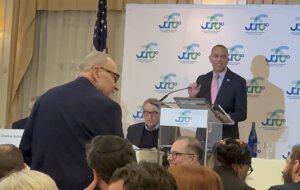
House Democratic Leader Hakeem Jeffries used a Jewish gathering in New York on Sunday to spotlight what he described as an imbalance in federal priorities, building on outrage over the Trump administration’s violent crackdown in Minneapolis that resulted in two fatal shootings.
Jeffries criticized the Republican-controlled Congress for boosting immigration enforcement funding by billions while, he said, security funding for Jewish institutions continues to lag amid rising antisemitic threats. He said that in the One Big Beautiful Bill Act, which passed last July and included cuts to Medicaid, the Department of Homeland Security received an additional $191 billion, including $75 billion for ICE.
“If that can happen, then the least that we can do is ensure that this vital security grant program is funded by hundreds of millions of dollars more to keep the Jewish community and every other community safe,” Jeffries said.
The Nonprofit Security Grant Program, established by Congress in 2005 and administered by FEMA under the Department of Homeland Security, provides funding to nonprofits, including houses of worship, to strengthen security against potential attacks. Congress began significantly increasing funding in 2018 after a wave of synagogue attacks nationwide, bringing the program to $270 million today.
Major Jewish organizations are pushing to raise funding to $500 million amid rising antisemitic threats. Last year, the Trump administration briefly froze the program as part of broader agency cuts, and some groups have been reluctant to apply because applicants must affirm cooperation with federal immigration enforcement.
Jeffries said House Democrats strongly support an increase to $500 million annually to meet escalating security needs. “It’s got to be an American issue, because that is what combating antisemitism should be all about,” he said.
The breakfast, previously held at the offices of the UJA-Federation of New York, was held this year for the first time in the events hall at Park East Synagogue, which was the site of a pro-Palestinian protest last year that featured antisemitic slogans and posters.
Sunday’s program also included remarks from Senate Minority Leader Chuck Schumer, who told the audience that his support for Jewish security funding will only continue growing under his leadership, calling it his “baby.”
“As long as I’m in the Senate, this program will continue to grow from strength to strength, and we won’t let anyone attack it or undo it,” Schumer said.
Rep. Jerry Nadler, the co-chair of the Congressional Jewish Caucus who is retiring at the end of the year after 36 years in the House, also spoke at the event. Nadler, like several other Democrats in recent months, compared the actions of ICE agents to the Gestapo, Nazi Germany’s secret police. The comparison has drawn sharp criticism from Democrats, Republicans and Jewish leaders.
Support for Israel aid
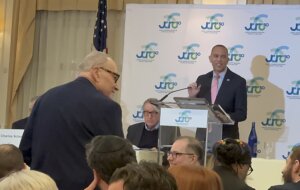
Both Schumer and Jeffries vowed in their remarks to continue supporting U.S. military assistance to Israel, amid increasing calls within the party for sharper opposition to Israel. Polls show that Democratic voters are increasingly sympathetic to Palestinians. In July, a record 27 Senate Democrats, a majority of the caucus, supported a pair of resolutions calling for the blocking of weapons transfers to Israel.
“I think it’s the humane thing to do to ensure that Israel has a right to exist as a Jewish and democratic state and eternal homeland for the Jewish people,” Jeffries said. The House Minority Leader, who has cultivated close ties with Jewish leaders since his election in 2012, noted that he has visited Israel nine times. He recalled that on his recent trip, Israel’s ambassador to the U.S., Yechiel Leiter, joked that it might be time for Democrats to buy property in Jerusalem.
Schumer, the nation’s highest-ranking Jewish elected official, has seen his popularity decline and has faced calls to step down from his role as leader. On Sunday, he pledged that he “will always fight to give Israel what it needs to protect itself from the many who want to wipe Israel off the face of the map.”
The post Democratic leader says GOP-led Congress boosted ICE funding while Jewish security is underfunded appeared first on The Forward.


